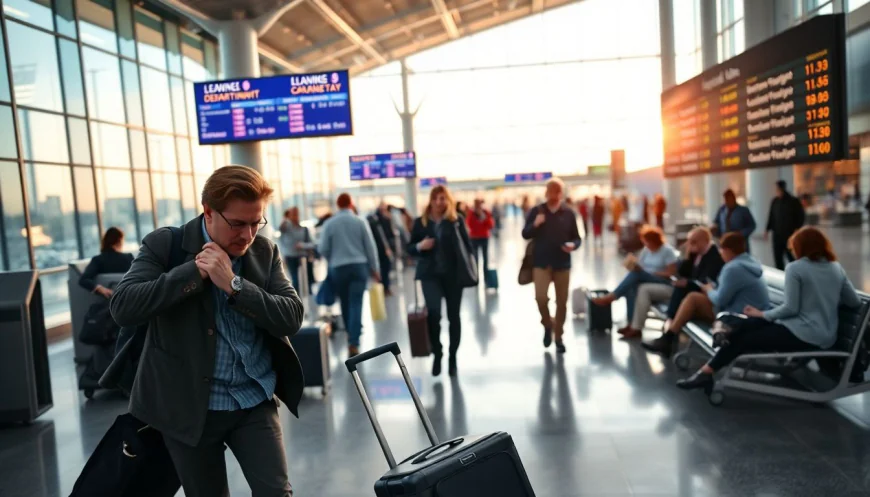Have You Ever Missed a Flight at the Airport? Causes, Recovery Strategies, and Prevention Tips
missed flight, airport delays, rebooking flights, travel mishaps, flight cancellation, airline policies, travel insurance, airport time management, standby flights, travel planning, flight alerts, airport stress, travel recovery tips

Have You Ever Missed a Flight at the Airport? Causes, Recovery Strategies, and Prevention Tips
Introduction
Missing a flight happens to many travelers—sometimes because of traffic, other times due to last-minute delays. It hits hard, leaving you stranded and stressed, with a race against the clock. This common travel mishap can turn your day upside down if you're not prepared. Knowing what causes missed flights, how to handle them, and ways to avoid feeling the panic next time can make all the difference.
This article covers the main reasons behind missed flights, what steps to take if it happens, and practical tips to stay ahead and keep calm.
Understanding Why Passengers Miss Flights
Common Reasons for Missing Flights
Most missed flights happen because of simple mistakes or unforeseen delays. Stricter security checks and long lines can turn a quick trip into a lost window of time. If you're running late because of traffic or misjudging how long the drive will take, missing the boarding time becomes a real risk. Overbooking flights and delays can also catch passengers off guard, especially if they don’t check updates often. Plus, many travelers forget to keep track of boarding times, gate changes, or both, which adds to the chaos.
External Factors Contributing to Missed Flights
Weather plays a big role—storm delays, fog, snow—things out of anyone’s control. These disruptions can slow down or shut down airport operations completely. Technical glitches with security systems or airport equipment can cause hold-ups too, impacting hundreds of flights. Sometimes, airlines cancel or delay flights for their own reasons, leaving passengers scrambling to rebook.
Personal Factors Influencing Missed Flights
Personal planning also matters. Poor time management or last-minute packing can eat into your schedule faster than you think. Overpacking causes security checks to drag on, and unexpected personal issues or health emergencies can pop up when least expected, making you miss your flight altogether.
How to Handle Missing Your Flight
Immediate Steps to Take After Realizing the Flight is Missed
As soon as you realize you cannot make the flight, don’t wait. Contact airline customer service immediately—many are willing to help if you call quickly. Ask about rebooking options; some might have fees, while others could offer free changes if you explain your situation. Understanding the airline's policy on missed flights or no-shows will help you know what to expect.
Rebooking and Alternative Travel Arrangements
Most airlines now have apps or websites where you can rebook fast. Standby lists may also give you a shot at getting on an earlier or later flight without extra charges. If all else fails, consider alternative options like trains or buses—sometimes a quick trip by land can save your day. Checking for flights on different airlines might also open up new doors, especially during peak seasons.
Legal and Financial Considerations
Rebooking or changing your ticket can come with extra fees, but travel insurance might cover missed flights if they’re due to unforeseeable issues. Emergency expenses—like taxi fares or last-minute hotel stays—should be managed carefully, especially if your trip becomes complicated because of the missed flight.
Preventing Missed Flights: Expert Tips and Best Practices
Planning Ahead for a Smooth Airport Experience
The key is to arrive early—most experts recommend arriving three hours before international flights, and at least two hours for domestic trips. Checking your flight status and gate info online or on airline apps before heading to the airport saves time and stress. Do a quick security pre-check: have your documents, boarding pass, and carry-on ready to speed through the process.
Effective Time Management Strategies
Set alarms or reminders about your departure time. Avoid last-minute packing or waiting until the last second to check in—offline or online—so you’re ready when it’s time. Keeping the airline’s notifications or airport apps active can give real-time updates about gate changes or delays, allowing you to adapt instantly.
Leveraging Technology and Services
Mobile boarding passes and online check-ins cut down waiting in lines. Weather and traffic apps help you plan your route better and avoid delays. Signing up for airline alerts ensures you’re among the first to know about flight updates, making last-minute surprises less likely.
Additional Tips for Stress-Free Travel
Pack smart—enough clothes and essentials to avoid last-minute scrambles at security. Prepare your travel documents the night before, so everything flows smoothly. Carry important items—medications, chargers, or valuables—in your carry-on, just in case you need to rebook or change plans unexpectedly.
Key Takeaways and Final Advice
Knowing common causes of missed flights helps you plan better. When things go wrong, quick action and understanding airline policies can save your trip. Using technology and arriving early are your best tools to avoid stress and chaos. Always stay informed, check updates often, and pack smart. Travel smart, stay calm, and your journey will keep running smoothly.
Plan ahead, stay aware, and turn travel mishaps into minor bumps on the road. Your next flight will thank you.



 VARSHITHA
VARSHITHA